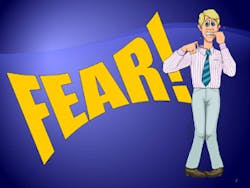According to Roger Solomon, PhD, fear is an automatic emotional reaction to a perceived danger or threat, characterized by a high state of arousal. Dr. Solomon is a clinical psychologist who specializes in trauma and grief. Formerly a psychologist with Colorado Springs, Colorado Police Department, and Washington State Patrol, he has also provided clinical services and training to the FBI, which is where I had occasion to listen to his explanation regarding what happens to our bodies when we experience fear. That high state of arousal is what we, as cops, need to understand.
Anyone one in law enforcement who tells you that he's not afraid during the course of his duties is either lying to you or is a psychopath. It's natural to experience fear when we're facing dangerous situations. Responding to a call of shots fired, man with a gun, robbery in progress... these are all potentially deadly force situations. Joe Citizen runs the other way when exposed to these types of events; cops run toward the danger, while fear, anxiety, and hasty game plans begin to fill their minds enroute. It's no shame to be afraid; it's not cowardly to admit it. They key to understanding fear is to know what to expect when our bodies shift gears into Solomon's high state of arousal. Knowing how our bodies will react during critical situations is key to our survival. Let's talk first about the physiological changes that occur to our bodies when we're afraid.
Heart Rate Increase: if you've been working out and are fit, this is of little concern. Your body is used to it and will function as if you're involved in another workout. If you're out of shape - you may have a problem.
Blood Pressure Increase: If you are suffering from high blood pressure this could potentially be fatal. Heart attacks and strokes may occur during a confrontation, or even before ever becoming involved. If, however, you are fit, or have your condition treated by a physician, your body will accept the increase.
Sugar and Energy Release: the body recognizes activity is about to increase. It releases adrenaline and, like any drug, adrenaline has its side effects. It's a potent potion, a hormone that triggers a bevy of physiological effects. First, it increases your metabolic rate and your blood sugar levels, providing a rocket-fuel like boost to your muscles. It also works as a neurotransmitter, amping up your responses and increasing your awareness.
Blood Flow to Muscles and Organs: the pathways to major muscle groups become wider, allowing for greater blood flow, thus bringing to them more oxygen for work that is more efficient. At the same time, capillaries close down; no blood flow is needed to the skin (think goose bumps).
Breathing Rate Increases: this is when the fight or flight response is triggered. Again, if you are fit, increased respiration will be of little concern.
Digestive System Shut Down: there will be an urge to move your bowels as the body prepares to engage in battle. It knows it needs to purge itself of toxins that may cause infection from stomach wounds. Thus, we see the phenomenon of people wetting themselves or defecating. It's all a product of fear.
All of the aforementioned changes are what occurs to our bodies physically when we're afraid. However, what happens to us conceptually, or what is the perceptual impact of fear?
Vision Becomes More Acute: we may experience tunnel vision. We identify a threat and narrow down our focus to include only the threat, thus, possibly missing other threats. Instructors need to imbue their students with the need to continue to scan for other threats.
Hearing Becomes More Acute: we many experience what's referred to as auditory exclusion, wherein we fail to hear important clues, e.g., gunshots, or a shouted warning from our partner, etc. Conversely, our hearing may become so acute that we're able to hear things that we normally wouldn't hear.
Perceptual Distortions May Occur: this phenomenon manifests itself most often with time distortion. You may have heard your colleagues describe a situation, a fight or gun battle. They'll tell you that it seemed the gunfight or the altercation went on for several minutes, when in reality, it may have lasted only several seconds. This is commonly referred to as the slow motion effect.
Understanding fear, and, more importantly, what our response to fear should be, is simply another item in our bag of officer survival tools. If you are not prepared to handle fear, it can lead to panic and indecision. Every second counts in a critical situation. More often than not, we find ourselves in a reactive mode, always having to wait for the bad guy to act first. If we can train ourselves to react appropriately to all of the possibilities we may face, we can at least put ourselves on a level playing field with the bad guy, thus ensuring that we will be going home that day. And when all is said and done, that is ultimately our goal... going home to our families.
Stay safe, brothers and sisters!
About the Author
John Wills
John M. Wills is a former Chicago police officer and retired FBI agent. He is a freelance writer and award-winning author in a variety of genres, including novels, short stories and poetry. John also writes book reviews for the New York Journal of Books, and is a member of the National Book Critics Circle. His new book, The Year Without Christmas, is available now. Visit John at: www.johnmwills.com.

